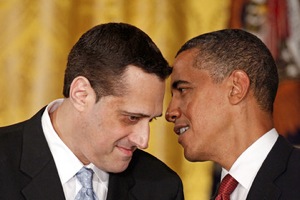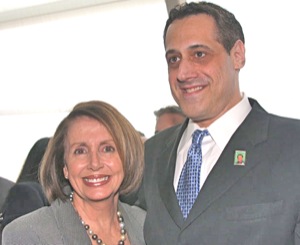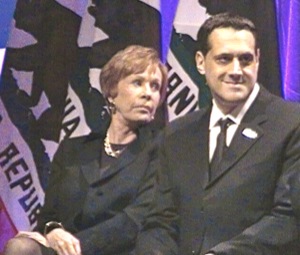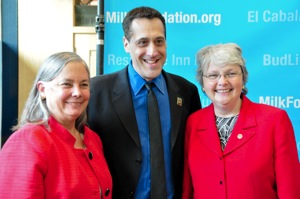feature
In the footsteps of greatness.
An interview with Stuart Milk
Published Thursday, 15-Jul-2010 in issue 1177
Stuart Milk - Human Rights Activist, GLBT Civil Rights Advocate, Global Equality Advisor, Youth and Workforce Services Advocate and founder of the Harvey Milk Foundation. Wow! That’s some intro. Stuart Milk is arguably one of the most key figures in the GLBT rights movement. He is committed to continuing the work started by his late uncle, Harvey Milk, to bring about a world without discrimination and without hate. Stuart has travelled thousands of miles, speaking in more than 40 states on GLBT issues and on the behalf of other minority groups. Stuart believes that his uncle’s legacy will be fully honored when, “...minority discrimination, inclusive of LGBT discrimination and LGBT prejudice, both legal AND societal, has been halted and equality becomes the norm not only in the US but throughout the globe.”
We are honored to have Stuart Milk serve as the San Diego Pride Grand Marshalls and equally honored that he took the time to talk with the Gay & Lesbian Times.
GLT: What has been the most rewarding part of your career?
SM: My full time “day job” has been in public service as a workforce advocate working with youth and disadvantaged adults. I find this meaningful, purposeful and self-sufficient employment.
GLT: How did it all start? Do you believe you were destined to do this type of work?
SM: The first time I addressed a large audience on LGBT rights and my Uncle’s legacy was in 1984, when I and Richard Smeichen (the academy award winning producer of the Times of Harvey Milk) spoke to a few thousand “progressive grass roots activists” for a convening at Oberlin College. Let me add that I was a very young activist then. I was 23 talking as an openly gay LGBT rights advocate to other young progressives and the topic of gay rights was not well received then. Thankfully, we have come quite a way with that young progressive community in the last 25 years.
GLT: Out of all the engagements you have done, does one stand out above the rest as your favorite?
SM: It has to be two engagements. The first being the Medal of Freedom ceremony at the White House, and being in a private clutch with just the President, First Lady and the 13 recipients of the Medal from Nobel Winner Desmond Tutu to Justice Sandra Day O’Connor. In the very intimate and non-public setting, the conversations were profound and the impact included the birth of the Harvey Milk Foundation.
The other engagement would have to be a panel I did in Istanbul. Here I learned and was able to see first hand the incredible toll of societal inequality that our LGBT brothers and sisters experience everyday. Also I was able to see the hope that I, primarily through my connection with Harvey, am able to give to communities that have so little optimism for an authentic life.
GLT: Would you consider yourself religious and what does religion mean to you and your fight for GLBT rights?
SM: I consider myself very spiritual and I believe we can find strength and wisdom in spirituality. We need to reach out to communities on the level where there can be dialogue to the more mystical parts of religion. A great example is the conversations I have had with Islamic legislators in the Middle East on the very open and diversity affirming elements of Sufism. Harvey actually was the first person in my life to give me a book by the great Sufi leader Rumi, and he circled his core message: “Between ideas of right and wrong, there is a field and one day we will all meet there”.
GLT: How would you describe your uncle?
SM: Harvey was my personal touchstone to authenticity. His love for me was unconditional and his support of me was immense. When I lost him at 17 I, along with the world, gained a inspirational icon who left a legacy of courage, an example of empathy and a message of hope that is still desperately needed today on a global level.
GLT: Was there anything he said to you that really sticks in your mind?
SM: My favorite saying from Harvey to me was from a Native American tradition that he inscribed to me: “You are the medicine that the world needs, even when the world does not recognize that”.
GLT: Do you see an end to prejudice against all minority groups at some point in time and if so when?
SM: What I see is the work needed. More than 80 nations deny our very right to exist as LGBT people and we are not alone in that denial of our most primitive rights as we are joined by women, children, seniors, ethnic and racial minorities. The message of my Uncle three decades ago is that we must band together and that is the compass that can get us to the point of time you ask about.
GLT: In your view what will it take to end all prejudice and hate?
SM: Martin Luther King said that:” Injustice anywhere is a threat to justice everywhere”.
We must come out of our regional and national ‘closet’ as prejudice and hate do not know community, state or national borders. We have seen throughout history marginalized and disenfranchised communities gain legal rights, only to have them taken away again, often brutally. Our fight must continue, as long as there are footholds of that prejudice thriving in parts of the world. A global solution is needed and is possible, if we are willing to see beyond our backyards and borders.
GLT: What is the funniest thing that ever happened between you and your uncle?
SM: Harvey was a producer with Tom O’Horgan of Jesus Christ Superstar on Broadway, and he took me at 9, to the premiere. After the show he asked who I wanted to meet, maybe Jesus or Mary Magdalene. I told him, quite confidently, that I wanted to meet King Herod and I wanted to meet ‘her” before she got out of drag. You should have seen the look on my Uncle’s face and we had quite a conversation that night.
GLT: Do you think there are similarities between the civil rights movement and the gay rights movement?
SM: President Obama said it best last Fall, ” It’s not for me to tell you to be patient, any more than it was for others to counsel patience to African Americans who were petitioning for equal rights a half-century ago.”
GLT: How do you feel about being the Grand Marshall of San Diego Pride and will you attend the festival?
SM: It is a great honor, as I have so much affection and love for the San Diego Community and the incredible progress that has been made collectively in San Diego. This progress has been achieved very much with the type of collaboration that Harvey envisioned for all of us to succeed. I try to attend as much as I can and soak up the color, diversity and inclusion that our communities bring to this celebration.
GLT: What do you want your legacy to be?
SM: I do not have a wish for a personal legacy. I do have a wish for a collective legacy that we, all of us who share this planet at this point in time, can reach beyond the small minded thoughts that allow people, groups of people and communities of people to separate and distance ourselves from others. Also to realize that we share this blue sphere hurtling through space together, not separately and we can only give birth to our full potential when we embrace and celebrate each other, without exception.
Stuart, thank you so much for taking the time out of your busy schedule to talk to us.
The Gay and Lesbian Times wishes you every success in your continuing fight against all forms of discrimination. San Diego welcomes you and we hope you enjoy Pride.
|
|
Copyright © 2003-2025 Uptown Publications





